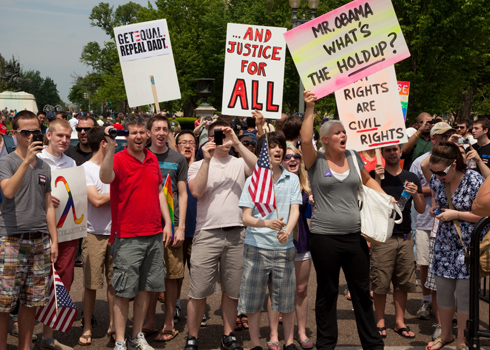According to a newly released Pew Research Center survey, 58% of Americans are in favor of allowing gays and lesbians to serve openly in the armed forces. Among those “who agree with the Tea Party,” however, only 38% share the sentiment.
Over the last few years, public opinion on the issue has changed very little– considering Pew’s surveys on the question since 2005, “roughly 60% have consistently favored permitting homosexuals to serve openly in the military.” Only 27% of the latest survey’s respondents oppose allowing gays and lesbians to openly serve.
While a majority of self-identified Democrats (70%) and independents (62%) are in support of allowing gays to serve openly in the military, Republicans are divided– the survey finds 40% in favor, while 44% are in opposition. Republican respondents split once more when those who “agree with the Tea Party” are considered distinctly from those “who disagree with the Tea Party.” Only 38% of Republicans and Republican leaners who agree with the movement support allowing gays to serve openly, while 48% are opposed. A majority (52%) of Republicans and Republican leaners who disagree with the Tea Party (or have no opinion of the movement) support allowing gays to openly serve in the armed forces.
Pew’s findings echo a mid-November Quinnipiac poll that found 58% of respondents favoring a repeal of “Dont Ask, Don’t Tell,” a law prohibiting gay men and women from serving openly in the military. A more recent November 18 McClatchy-Marist survey suggested a narrower opinion gap: 47% of registered voters said DADT should be repealed, while 48% suggested the law should remain in place. In that survey, 30% of Tea Partiers favored repeal, while 66% opposed it.
Though the issue of gays in the military remains in the public eye, a recent Gallup survey suggests it is not a top priority for Americans– only 32% of survey respondents indicated it was a “very important” issue to address during Congress’s lame-duck session. The estate tax was found to be the issue of greatest concern to respondents, as 56% indicated it was a very important issue.
The margin of error for Pew’s latest survey is ±3.5 percentage points.






